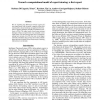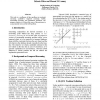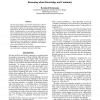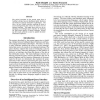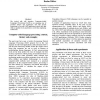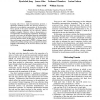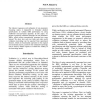FLAIRS
2006
14 years 28 days ago
2006
We are exploring the differences between expert and less expert tutors with two goals: cognitive (what does tutoring tell us about learning) and applied (which features of tutorin...
FLAIRS
2006
14 years 28 days ago
2006
This work is a confluence of three problems in constraint reasoning: qualitative temporal reasoning (QTR), incremental reasoning, and explanation generation. Our primary objective...
FLAIRS
2006
14 years 28 days ago
2006
A process is described for selecting the subset of internal models needed to perform situation assessment and organizing them in a representation we designate a mental space. A co...
FLAIRS
2006
14 years 28 days ago
2006
The aim of this paper is to extend the modal logic of knowledge due to Moss and Parikh by state transformers arising, eg, from actions of agents. The peculiarity of Moss and Parik...
FLAIRS
2006
14 years 28 days ago
2006
The project described by the present paper aims at building a bridge between Intelligent Query Interfaces and Natural Language Generation technologies. The idea is to have a query...
FLAIRS
2006
14 years 28 days ago
2006
The invited talk will introduce Computer-Aided Language Processing (CALP) as an emerging area of practical interest and significance and will present experiments of several CALP a...
FLAIRS
2006
14 years 28 days ago
2006
Conversational Case-Based Reasoning (CCBR) provides a mixed-initiative dialog for guiding users to refine their problem descriptions incrementally through a question-answering seq...
FLAIRS
2006
14 years 28 days ago
2006
This paper outlines a symbolic computational theory for recognizing variable spatial environments-The Theory of Cognitive Prism, (Dong 2005). This theory defines distance and orie...
FLAIRS
2006
14 years 28 days ago
2006
Learning tasks from a single demonstration presents a significant challenge because the observed sequence is inherently an incomplete representation of the procedure that is speci...
FLAIRS
2006
14 years 28 days ago
2006
The inherent vagueness and ambiguity of non-monotonic reasoning makes it impossible to formulate detailed specifications to validate KBS performance by using traditional test-case...
